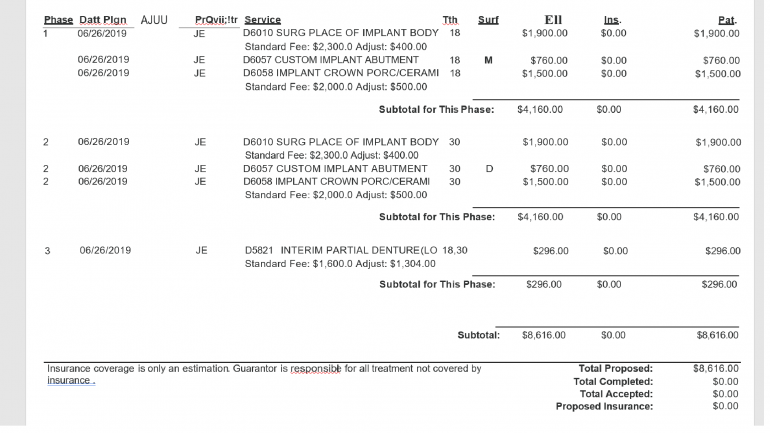
Dental Code D6790: Retainer crown - full cast high noble metal
Dental Code D6790 refers to a specific dental procedure known as a Retainer Crown - Full Cast High Noble Metal. This code is utilized in dental practices to accurately document and bill for this particular treatment.
Dental Code D6790 Price Range
On average, patients pay $1200 for this D6790 service at the dentist's office, with as little as $940 charged for this in less expensive cities and as much as $1670 in more expensive cities.
Low cost of living | Medium cost of living | High cost of living |
Memphis (Tennessee), Cincinnati (Ohio) | Miami (Florida), Denver (Colorado), Austin (Texas) | (New York (New York), San Francisco (California) |
$940 | $1200 | $1670 |
However, the price for the service D6790 depends not only on the region where you live, but also varies from dentist to dentist. Therefore, it makes sense to compare prices before choosing a dentist. The best way to do this price comparison is at Dr. BestPrice and save a lot of money.
What does the code mean?
The dental code D6790 corresponds to the placement of a retainer crown made from full cast high noble metal. A retainer crown is a type of dental restoration used to protect and reinforce a tooth that has been compromised due to decay, trauma, or other dental concerns. The full cast high noble metal refers to the specific material used to fabricate the crown. High noble metals, such as gold, platinum, and palladium, offer excellent biocompatibility, durability, and longevity.
Diagnosis and Treatment Planning
Before proceeding with the retainer crown procedure, the dentist will perform a comprehensive examination of the patient's oral health. This includes assessing the affected tooth, reviewing any necessary dental X-rays, and discussing the patient's concerns and treatment goals. Based on the findings, the dentist will develop an appropriate treatment plan, which may involve the use of a retainer crown.
Tooth Preparation
To accommodate the retainer crown, the affected tooth needs to be prepared. The dentist will administer local anesthesia to ensure the patient's comfort. Next, they will carefully remove any existing decay or damaged portions of the tooth. The tooth is then reshaped using specialized dental instruments to create an ideal foundation for the crown. The amount of tooth structure removed depends on the severity of the damage and the specific requirements of the case. During the tooth preparation process, the dentist may also address any underlying issues such as root canal treatment or gum disease to ensure the tooth's optimal health. This comprehensive approach helps to create a stable and healthy foundation for the retainer crown, enhancing its long-term success. The dentist will communicate with the patient throughout the procedure, explaining each step and addressing any concerns to ensure a comfortable and successful treatment experience.
Impression Taking
Once the tooth preparation is complete, the dentist will take an impression of the prepared tooth and the surrounding teeth. This is typically done using a putty-like material or a digital scanner. The impression captures the exact shape and size of the tooth, allowing the dental laboratory to fabricate a custom-fit retainer crown that precisely matches the patient's dentition. In addition to capturing the shape and size of the tooth, the dental impression also records the details of the adjacent teeth and the patient's bite. This comprehensive impression ensures that the final retainer crown fits harmoniously within the patient's dental arch. The use of digital scanners has revolutionized the impression-taking process, providing highly accurate and efficient results while improving patient comfort.
Temporary Crown Placement
While the custom retainer crown is being fabricated at the dental laboratory, a temporary crown is typically placed over the prepared tooth. This temporary crown protects the tooth, maintains proper alignment, and helps restore normal function and aesthetics. It is important for patients to adhere to any specific care instructions provided by their dentist to ensure the longevity and stability of the temporary crown.
Crown Try-In and Adjustment
Once the dental laboratory completes the fabrication of the custom retainer crown, the patient returns to the dental office for the try-in appointment. During this visit, the dentist checks the fit, shape, and color of the crown. Any necessary adjustments are made to ensure a proper fit and occlusion. The dentist will also evaluate the aesthetics of the crown to ensure it blends seamlessly with the patient's natural teeth.
Final Crown Placement
After the try-in appointment, the final retainer crown is ready for placement. The dentist will remove the temporary crown, thoroughly clean the prepared tooth, and apply dental cement to bond the retainer crown in place. Excess cement is carefully removed, and the occlusion is checked to ensure proper alignment and function. The patient is provided with post-operative instructions regarding oral hygiene, diet, and follow-up visits. Following the final crown placement, the patient may experience some initial sensitivity, which typically subsides within a few days. It is important for the patient to maintain regular oral hygiene practices, including brushing, flossing, and attending routine dental check-ups, to ensure the long-term success of the retainer crown. In the event of any discomfort or issues with the crown, the patient should promptly contact their dentist for evaluation and adjustments if necessary.
Summary of Dental Code D6790
Dental Code D6790 represents the placement of a retainer crown made from full cast high noble metal. This procedure involves several essential steps, including diagnosis and treatment planning, tooth preparation, impression taking, temporary crown placement, crown try-in and adjustment, and final crown placement. The use of high noble metal ensures the crown's durability, longevity, and biocompatibility. By understanding the details of this dental code, patients can have a better understanding of the treatment involved and its benefits in restoring oral health and function.
Start your search for affordable dental care by comparing prices on Dr. BestPrice – your key to quality within budget.
